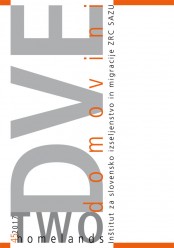Refugees and “Odmevi”: The Epistemology of Conventions
DOI:
https://doi.org/10.3986/dd.2017.1.12Keywords:
refugees, tv interview, neutralism, accessed voices, conversation analysisAbstract
In this article I investigate the representation of the “refugee problem” in the Odmevi current affairs program on Slovenian national TV. I aim to explore how conventional, naturalized codes and neutralism as a constitutive element of professional self-presentation in political journalism determined the treatment of the “refugee problem”. In this context, I analyze the selection of external or “accessed” voices in the Odmevi studio interview, the discursive framing of interviewees and their placement into the show’s narrative. The main findings are a) that the selection and b) the discursive treatment of studio guests in Odmevi’s interviews caused or rather enabled the debate on the “refugee problem” to be narrowed to the sphere of legitimate controversy represented by partisan politics. The selection and treatment of accessed voices (interviewees and guests) created the so-called opinion or discursive tunnel, which consequently led to the complete symbolical marginalization of all views that fell outside the parliamentary mainstream and its interests, and hence to treating the problem as a mere sequence of events.
Downloads
References
Clayman, Steven E. (1992). Footing in the achievement of neutrality: The case of news interview discourse. Talk at work: Interaction in institutional settings (ur. Paul Drew, John Heritage). Cambridge: Cambridge University Press, 163–198.
Clayman, Steven E. (2006). Reformulation the Question: A Device for Answering / Not Answering Questions in News Interview and Press Conferences. Conversation Analysis, vol. IV. (ur. Paul Drew, John Heritage). London: Sage.
Clayman, Steven E., Heritage, John (2008). The News Interview: Journalists and Public Figures on the Air (Studies in Interactional Sociolinguistics). Cambridge: Cambridge University Press.
Couldry, Nick (2003). Media rituals: A critical approach. New York, London: Routledge.
Couldry, Nick (2006). Listening Beyond the Echoes: Media, Ethics, and Agency in an Uncertain World. New York, London: Routledge.
Drew, Paul, Heritage, John (ur.) (1992). Talk at work: Interaction in institutional settings. Cambridge: Cambridge University Press.
Doupona Horvat, Marjeta, Verschueren, Jef, Žagar, Igor Ž. (1998/2001). Retorika begunske politike v Sloveniji: Pragmatika legitimizacije. Ljubljana: Mirovni inštitut.
Ekström, Mats (2002). Epistemologies of TV journalism: A theoretical framework. Journalism 3/3, 259–282.
Fiske, John (2004): Televizijska kultura: Branja poročil, bralci poročil. Medijska kultura: Kako brati medijske tekste (ur. Breda Luthar idr.). Ljubljana: Študentska založba, 147– 179.
Garcia, Angela (1991). Dispute revolution without disputing: How the interactional organization of medation hearings minimizes argument. American Sociological Review 56, 818–835.
Goffman, Ervin (1959/2014). Predstavljanje sebe v vsakdanjem življenju. Ljubljana: Studia Humanitatis.
Goffman, Ervin (1981). Forms of Talk. Pennsylvania: University of Pennsylvannia Press.
Greatbach, David (1992) On the management of disagreement between news interviewees. Talk at work: Interaction in institutional settings (ur. Paul Drew, John Heritage). Cambridge: Cambridge University Press, 268–301.
Haarman, Louann (2004). ‘John, What’s Going On?’: Some features of life exchanges on television news. Corpora and Discourse (ur. Alan Partington, John Morley, Louann Haarman). Bern: Peter Lang, 71–88.
Hallin, C. Daniel (1994). We keep America on top of the World. New York, London: Routledge.
Hartley, John, Fiske, John (1978). Reading Television. New York, London: Routledge.
Hartley, John (2007). TV Truths. Oxford: Blackwell.
Heritage, John (1985). Anlyzing News interviews: Aspect of the production of talk for an overhearing audience. Handbook of Discourse Analysis. Volume 3: Discourse and Dialogue (ur. Teun A. van Dijk). London: Academic Press, 95–119.
Heritage John (2004). Conversation Analysis and Institutional Talk. Handbook of language and social interaction (ur. Robert Sander, Fitch Kristine). New York, London: Routledge, 103–146.
Hutchby, Ian (2006). Media Talk: Conversation Analysis and the Study of Broadcasting. Maidenhead: Open University Press.
Iyengar, Shanto (1991). Is anyone responsible: How television frames political issues. Chicago: University of Chicago Press.
Iyengar, Shanto, Hahn, Kyu S. (2010). The Political Economy of Mass Media: Implications for Informed Citizenship. Manipulating Democracy: Democratic Theory, Political Psychology, and Mass Media. New York, London: Routledge.
Jontes, Dejan (2011). Novinarstvo kot kultura. Ljubljana: Fakulteta za družbene vede. Kralj, Ana (2008). Nezaželeni? Medijske in politične konstrukcije tujcev v Sloveniji. Dve domovini / Two Homelands 27, 169–190.
MacDonald, Myra (2003). Exploring Media Discourse. London: Hodder Education Publisher.
Meikle, Graham (2013). Find out Exactly What to think – Next! Chris Morris, Brass Eye and Journalistic Authority. News Parody and Political Satire Across the Globe (ur. Geoffrey Baym, Jeffrey P. Jones). New York, London: Routledge.
Montgomery, Martin (2010). The Discourse of the Broadcast News Interview: A typology. Language and Journalism (ur. John E. Richardson). New York, London: Routledge, 109–126.
Pajnik, Mojca (2007). Medijske podobe o beguncih. Socialno delo 46/1–2, 1–11.
Pan, Zhongdang, Kosicki, Gerald M. (1993). Framing Analysis: An Approach to News Discourse. Political Communication 10, 55–75.
Sacks, Herbert (1992). Lectures on Conversation (ur. Gail Jefferson). Oxford: Blackwell.
Sjovaag, Hjelle (2013). Journalistic Autonomy: Between Structure, Agency and Institution. Nordicom 34, 155–166.
Tolson, Andrew (2006). Media Talk: Spoken Discourse on TV and Radio. Edinburgh: Edinburgh University Press.
Vezovnik, Andreja (2015). Balkan immigrant workers as Slovenian victimized heroes. Slavic review 74/2, 244–264.
Zavratnik, Simona (2003). Žongliranje z »vojno«. Poročilo skupine za spremljanje nestrpnosti 2, 128–143.
Zelizer, Barbie, Stuart, Allen (2010). Keywords in News & Journalism Studies. Maidenhill: Open University Press.
Downloads
Published
How to Cite
Issue
Section
License

This work is licensed under a Creative Commons Attribution-NonCommercial-NoDerivatives 4.0 International License.
Authors guarantee that the work is their own original creation and does not infringe any statutory or common-law copyright or any proprietary right of any third party. In case of claims by third parties, authors commit their self to defend the interests of the publisher, and shall cover any potential costs.
More in: Submission chapter





